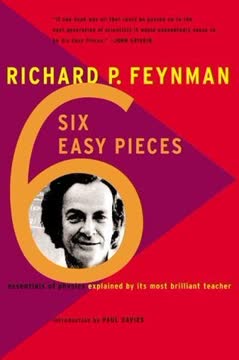Key Takeaways
1. Curiosity and playfulness drive scientific discovery
I was playing with this thing, and I realized I was discovering something.
Childlike wonder. Feynman's approach to science was characterized by an insatiable curiosity and a playful attitude. He viewed scientific exploration as an exciting adventure, often likening it to solving puzzles or playing games. This mindset allowed him to approach complex problems with fresh perspectives and creative solutions.
Hands-on experimentation. Feynman believed in learning through direct experience and experimentation. He encouraged students and colleagues to:
- Ask questions constantly
- Tinker with equipment and ideas
- Explore phenomena firsthand
- Challenge assumptions and theories
By maintaining this sense of wonder and hands-on approach, Feynman made groundbreaking discoveries in quantum electrodynamics and other fields, demonstrating that playfulness can be a powerful tool in scientific advancement.
2. Question authority and think independently
I don't believe in the idea that there are a few peculiar people capable of understanding math, and the rest of the world is normal. Math is a human discovery, and it's no more complicated than humans can understand.
Critical thinking. Feynman consistently challenged established norms and encouraged others to do the same. He believed that blind acceptance of authority or conventional wisdom hindered scientific progress and personal growth.
Intellectual independence. Feynman's approach to learning and problem-solving emphasized:
- Developing one's own understanding
- Questioning assumptions and methods
- Seeking alternative explanations
- Valuing personal experience over secondhand knowledge
This independent thinking led Feynman to make significant contributions to physics and other fields, often by approaching problems from unconventional angles. His willingness to challenge authority and think for himself not only advanced science but also inspired countless others to adopt a more critical and inquisitive mindset.
3. Embrace failure as a learning opportunity
The first principle is that you must not fool yourself—and you are the easiest person to fool.
Growth mindset. Feynman viewed failures and mistakes not as setbacks, but as valuable learning experiences. He believed that acknowledging and analyzing one's errors was crucial for personal and scientific growth.
Failure as a tool. Feynman's approach to failure included:
- Openly admitting mistakes
- Analyzing failures to extract lessons
- Using setbacks as motivation for further inquiry
- Encouraging a culture of openness about errors in scientific communities
This attitude towards failure allowed Feynman to persist in the face of challenges and make significant breakthroughs. It also fostered a more honest and productive scientific environment, where errors were seen as stepping stones to discovery rather than sources of shame.
4. Simplify complex ideas for better understanding
If you can't explain something to a first year student, then you haven't really understood it.
Clear communication. Feynman was renowned for his ability to break down complex scientific concepts into simple, understandable terms. He believed that true understanding of a subject was demonstrated by the ability to explain it clearly to others.
The Feynman Technique. This method for learning and explaining complex topics involves:
- Choose a concept to learn
- Explain it to a 12-year-old
- Identify gaps in your explanation
- Review and simplify
By consistently applying this approach, Feynman not only improved his own understanding of various subjects but also became an exceptional teacher and communicator of scientific ideas. This skill was crucial in making physics more accessible to students and the general public alike.
5. Maintain integrity in scientific pursuits
The idea is to try to give all the information to help others to judge the value of your contribution; not just the information that leads to judgment in one particular direction or another.
Scientific honesty. Feynman was a staunch advocate for integrity in scientific research. He believed that scientists had a responsibility to present their findings honestly and completely, regardless of personal or professional consequences.
Ethical considerations in science:
- Reporting all relevant data, not just favorable results
- Acknowledging limitations and potential errors in research
- Resisting pressure to manipulate or selectively present findings
- Encouraging open debate and criticism of scientific work
Feynman's commitment to scientific integrity not only enhanced the credibility of his own work but also set a high standard for the scientific community as a whole. His emphasis on honesty and transparency in research continues to influence scientific practices today.
6. Balance scientific rigor with practical problem-solving
For a successful technology, reality must take precedence over public relations, for nature cannot be fooled.
Pragmatic approach. While Feynman was a theoretical physicist, he also recognized the importance of practical problem-solving. He often applied his scientific knowledge to real-world challenges, demonstrating the value of combining theoretical understanding with practical application.
Bridging theory and practice:
- Applying theoretical concepts to solve everyday problems
- Recognizing the limitations of pure theory in real-world scenarios
- Encouraging interdisciplinary collaboration
- Valuing both abstract thinking and hands-on experimentation
Feynman's ability to balance rigorous scientific thinking with practical problem-solving was evident in his work on the Manhattan Project and his investigation of the Challenger disaster. This approach not only advanced scientific understanding but also demonstrated the real-world impact of scientific knowledge.
7. Cultivate a diverse range of interests and skills
I was an ordinary person who studied hard. There are no miracle people. It happens they get interested in this thing and they learn all this stuff, but they're just people.
Multidisciplinary curiosity. Feynman believed in exploring a wide range of interests beyond his primary field of physics. He actively pursued diverse hobbies and areas of study, which often informed and enriched his scientific work.
Broad knowledge base. Feynman's diverse interests included:
- Music (playing bongo drums)
- Art (drawing and painting)
- Biology (studying ants and repairing radios)
- Languages (learning Portuguese)
- Lock-picking and safe-cracking
By cultivating such a diverse range of skills and interests, Feynman was able to approach scientific problems from unique angles and draw insights from seemingly unrelated fields. This multidisciplinary approach not only made him a more well-rounded scientist but also a more engaging teacher and communicator.
8. Recognize the human side of scientific endeavors
The prize is the pleasure of finding the thing out, the kick in the discovery, the observation that other people use it. Those are the real things.
Science as a human activity. Feynman emphasized that science is fundamentally a human endeavor, driven by curiosity, creativity, and collaboration. He believed in recognizing and celebrating the personal and emotional aspects of scientific work.
Human elements in science:
- The joy of discovery and understanding
- The importance of mentorship and collaboration
- The role of intuition and creativity in problem-solving
- The impact of personal biases and experiences on scientific inquiry
By acknowledging these human elements, Feynman made science more accessible and relatable to both fellow scientists and the general public. His approach helped demystify the scientific process and inspired others to engage with science on a more personal level.
9. Challenge conventional wisdom and established norms
The first principle is that you must not fool yourself—and you are the easiest person to fool.
Intellectual courage. Feynman consistently challenged established theories and methodologies, even when it meant going against prevailing scientific opinions. He believed that progress in science often required questioning and reevaluating accepted ideas.
Challenging the status quo:
- Critically examining established theories
- Proposing alternative explanations and approaches
- Encouraging skepticism and debate in scientific discourse
- Valuing evidence over authority or consensus
Feynman's willingness to challenge conventional wisdom led to significant breakthroughs in physics and other fields. His approach inspired a generation of scientists to think more critically and creatively about their work, fostering a culture of innovation and progress in the scientific community.
10. Communicate science effectively to diverse audiences
If I could explain it to the average person, I wouldn't have been worth the Nobel Prize.
Adaptable communication. Feynman was renowned for his ability to explain complex scientific concepts to a wide range of audiences, from fellow physicists to the general public. He believed that effective communication was crucial for advancing scientific understanding and engaging the public with science.
Strategies for effective science communication:
- Using analogies and metaphors to explain abstract concepts
- Employing humor and personal anecdotes to make science relatable
- Adapting language and examples to suit the audience's background
- Emphasizing the practical implications and real-world applications of scientific ideas
Feynman's skill in communicating science not only made him a beloved teacher and lecturer but also contributed to greater public understanding and appreciation of science. His approach continues to influence science communicators and educators today, emphasizing the importance of making complex ideas accessible to diverse audiences.
Last updated:
FAQ
What's Surely You're Joking, Mr. Feynman! about?
- Memoirs of Richard Feynman: The book is a collection of autobiographical stories from the life of physicist Richard P. Feynman, highlighting his curiosity and unconventional approach to life and science.
- Humor and Adventures: Feynman shares humorous and outrageous anecdotes, from childhood experiments to his work on the Manhattan Project, showcasing his mischievous nature.
- Philosophical Reflections: The book delves into Feynman's thoughts on science, art, and the human experience, encouraging readers to think critically and embrace curiosity.
Why should I read Surely You're Joking, Mr. Feynman!?
- Engaging Storytelling: Feynman's writing is captivating and filled with humor, making complex scientific ideas accessible and enjoyable for readers of all backgrounds.
- Inspiration for Curiosity: The book encourages readers to embrace their curiosity and approach problems with a playful mindset, reflecting Feynman's own approach to learning and discovery.
- Lessons on Integrity: Feynman discusses the importance of scientific integrity and honesty, offering valuable insights applicable to various fields.
What are the key takeaways of Surely You're Joking, Mr. Feynman!?
- Embrace Curiosity: Feynman emphasizes the importance of being curious and asking questions, which leads to deeper understanding and enjoyment in learning.
- Value of Playfulness: The book illustrates that approaching challenges with a sense of play can lead to innovative solutions and a more fulfilling life.
- Scientific Integrity: Feynman highlights the necessity of honesty and transparency in scientific research, cautioning against superficial adherence to methods without true understanding.
What are the best quotes from Surely You're Joking, Mr. Feynman! and what do they mean?
- "The pleasure of finding things out": This quote encapsulates Feynman's love for discovery and the joy that comes from understanding how things work.
- "The first principle is that you must not fool yourself—and you are the easiest person to fool.": Feynman underscores the importance of self-awareness and critical thinking in science.
- "Science is the belief in the ignorance of experts.": This quote encourages questioning authority and established knowledge for scientific progress.
What is Richard Feynman's approach to problem-solving in Surely You're Joking, Mr. Feynman!?
- Curiosity-Driven Exploration: Feynman approaches problems with a sense of wonder, allowing him to explore various angles and solutions.
- Hands-On Experimentation: He emphasizes practical experience and experimentation, as seen in his childhood experiments with radios and electronics.
- Creative Thinking: Feynman encourages thinking outside the box, using unconventional methods to solve problems.
How does Feynman describe his childhood experiences in Surely You're Joking, Mr. Feynman!?
- Inventive and Curious Nature: Feynman recounts his childhood experiments, such as building radios, showcasing his early fascination with science.
- Mischievous Adventures: He shares humorous stories of his childhood antics, reflecting his playful spirit.
- Learning Through Play: Feynman illustrates how his playful approach to learning laid the foundation for his later scientific endeavors.
What role does science play in Surely You're Joking, Mr. Feynman!?
- Background to Personal Stories: Science serves as a backdrop to many of Feynman's anecdotes, illustrating his passion for the subject.
- Philosophy of Science: Feynman discusses the scientific method and the importance of skepticism, critical thinking, and creativity.
- Joy of Discovery: The book conveys Feynman's love for science as a means of understanding the world.
What is “cargo cult science” as defined in Surely You're Joking, Mr. Feynman!?
- Definition of Cargo Cult Science: Feynman describes it as practices that superficially resemble scientific methods but lack true rigor and integrity.
- Examples and Criticism: He criticizes fields where results are manipulated or misinterpreted, emphasizing honest reporting and critical evaluation.
- Call for Integrity: Feynman advocates for transparency and thoroughness in research to ensure genuine scientific progress.
How does Feynman view education in Surely You're Joking, Mr. Feynman!?
- Critique of Traditional Methods: Feynman critiques rote memorization and emphasizes the need for experiential learning and critical thinking.
- Encouragement of Curiosity: He advocates for fostering curiosity in students, encouraging them to ask questions and explore topics deeply.
- Importance of Engagement: Feynman believes that engaging students in the learning process leads to a more meaningful educational experience.
How does Feynman describe his experiences with art in Surely You're Joking, Mr. Feynman!?
- Art as Expression: Feynman explores his journey in learning to draw and paint, highlighting the emotional connection he seeks to convey.
- Learning from Artists: He shares interactions with artists and how they influenced his understanding of creativity.
- Personal Growth: Feynman’s pursuit of art serves as a means of personal development, paralleling his scientific endeavors.
How does Feynman approach the concept of hallucinations in Surely You're Joking, Mr. Feynman!?
- Experiments with Sensory Deprivation: Feynman describes his experiences in isolation tanks, exploring the nature of hallucinations.
- Reality vs. Hallucination: He emphasizes recognizing the difference between hallucinations and actual experiences.
- Exploration of Consciousness: Feynman’s reflections lead him to ponder the nature of consciousness and memory.
How does Feynman’s work on the Manhattan Project influence his views in Surely You're Joking, Mr. Feynman!?
- Ethical Reflections: Feynman discusses the moral dilemmas he faced while working on the atomic bomb.
- Collaboration and Camaraderie: He shares anecdotes about the collaborative spirit among scientists during the project.
- Lessons Learned: The experience shapes Feynman’s understanding of the responsibilities of scientists, advocating for ethical considerations in research.
Review Summary
"Surely You're Joking, Mr. Feynman!" receives mixed reviews. Many praise Feynman's brilliance, curiosity, and humor, finding the anecdotes entertaining and inspiring. They appreciate his unconventional approach to learning and problem-solving. However, some readers criticize Feynman's perceived arrogance, misogyny, and self-aggrandizement. The book's structure and writing style are also points of contention. Despite the divided opinions, most agree that the book offers unique insights into the mind of a renowned physicist and his adventures in science and life.
Similar Books










Download PDF
Download EPUB
.epub digital book format is ideal for reading ebooks on phones, tablets, and e-readers.









